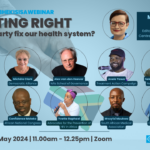- From NHI to climate change, corruption and social grants to gender-based violence, Bhekisisa is rolling out a handy online tool to help you scrutinise parties’ manifestos for what they promise on healthcare.
- Right now, you will have access to the big parties ANC, DA and EFF — then we move on to smaller parties that have drawn media attention.
- It’s about making informed decisions on the big issues that can affect your health and checking that scientific thought isn’t destroyed by political agendas.
- Our tool is dynamic — we will add more parties as the countdown to 29 May continues.
We just launched an analysis tool to help you make sense of our political parties’ healthcare promises. Why should you use it? Read today’s newsletter to find out. Sign up.

Last week, we launched the first post in our series to analyse what parties say in their manifestos about health in the run-up to the general elections this month.
We promised that an analysis tool would follow — and here it is today.
You might say that many other news outlets are looking at parties’ election speak too, so why have another tool?
Because we’re not replacing others; we’re adding to the conversation, zooming in on health issues, which we’ve split up into different categories.
South Africa’s seventh round of democratic elections will be as pivotal for the country’s future as the first one in 1994 — as any one party achieving a comfortable majority might not be as easy as before. There have never been more players to choose from — and everyone wants a slice of the pie.
But it’s difficult to understand what parties’ promises really mean when they’re wrapped up in long sentences, lots of jargon and many numbers. It’s even more difficult to look back later to hold newly elected leaders accountable.
And that’s the power of our tool: it gives you the background against which to scrutinise a party’s promises and make sense of it, in easy, understandable language. Because that’s what Bhekisisa stands for.
How to use the tool
The party line-up in our tool includes the three with the largest representation in parliament — the ANC, DA and EFF — and 12 more (for now). For newcomers or smaller players, we looked at how commonly they were discussed in the media (we used this as a proxy as to how much interest there would be in the party).
We’ve broken down what the different parties say about health matters into nine categories — from rolling out universal healthcare and dealing with the effects of climate change to rooting out corruption in health services and tackling HIV, tuberculosis and gender-based violence. We also include food security, social grants and the basic income grant in our analysis, because being able to eat well and having enough money to live are part of building healthy nations.
You can decide in how much depth you want to compare parties’ promises:
- Look at only the landing page to get a quick overview of what parties cover — a green tick means the issue is mentioned in the manifesto; a black cross means it’s not.
- If you want to go deeper, click on a tick or cross in a party column to see what they say (or don’t say) about that specific issue. You can go back to the tool from there.
- If you want to see what a party says about each of the nine issues in one go, click on the block in the first row under a party’s name or logo to be taken to a page where you can read everything at once. Again, you can link back to the full tool to look at another party.
- If you want to read a party’s full, original manifesto, click on the link we show on their analysis page.
Analysing the manifestos and unpacking the full picture is a big undertaking, so we’re starting off with seven today and will be adding more every day or two as we go. Keep an eye on our social media channels for alerts about updates to the tool.
Why should you use this tool?
The short answer is to help you vote for what you believe is right.
Governments have the power to decide whether people live or die when it comes to health — and your vote will determine which type of government we get.
In South Africa, this kind of influence became especially apparent in the late 1990s and early 2000s when the Mbeki government denied South Africans free HIV treatment, resulting in over 330 000 unnecessary deaths.
In 2004, our government’s policy changed, resulting in the country now having the largest antiretroviral treatment in the world and people with HIV living almost as long as HIV-negative people.
“The dynamics between politics, science and medicine continue,” Malegapuru Makgoba, esteemed academic, immunologist and most recently South Africa’s health ombud, told Mia Malan in an interview in April for Bhekisisa’s monthly TV show, Health Beat.
The only way to make sure that politics don’t take over scientific thought, is to know what politicians’ promises mean.
Use our tool to make sense of it all.





